Good Growth Dekalb is a group of concerned citizens and neighbors who live in communities near Suburban Plaza, a 1960s shopping mall that’s been allowed to languish for over twenty years. There are some stores that have thrived despite the recent economic stress. Big Lots is the company’s most successful Atlanta location and Last Chance Thrift Store is beloved by many. Decatur Estate and Way Back Antiques does a good business and historic Onstage Atlanta has long attracted an audience in its theater space in the center.
AJC file. Suburban Plaza circa 1960.
The owner, Selig Enterprises, has found a willing tenant to anchor its proposed redevelopment; Walmart and a 149,000 square foot super-store. Neighborhood groups met earlier this fall to draw up non-binding concessions from the developer that other communities’ experiences suggest Walmart will never honor.
This is a plan from Selig with some concessions highlighted in red, courtesy of the Decatur Metro blog. Higher resolution here.
Good Growth Dekalb evolved out of many neighbors’ frustrations at questions that weren’t asked at any of the neighborhood association meetings, and a parking variance approval that went through without Dekalb county demanding any study, whether for the increased traffic or an environmental impact report. Since according to GADOT, over 70,000 vehicles travel Scott Blvd on a daily basis, an independent traffic impact study is one of the issues that GGD would like to address and the group hired a land use lawyer to investigate whether the county was remiss.
Last Saturday about 100 people marched in protest from Suburban Plaza to the Decatur Square. Musicians from the Atlanta Sedition Orchestra provided accompaniment. Press coverage included broadcasts from Channel 5 News and Channel 2, articles in the Atlanta Journal Constitution and the Avondale-Decatur Patch blog.
The Atlanta Sedition Orchestra plays for activism projects in Atlanta’s progressive community.
GGD’s mascot, the hard working Melanie Parker – who also writes our press releases.
WSB Channel 2’s Angelique Proctor interviews Brian Westlake, a resident in the area.
Fox News Channel 5 interviews Stacie Dixon, GGD’s fearless coordinator and the channel broadcast two clips of video on the event.
Decatur Mayor Bill Floyd spoke to the crowd and gave his support, although the city has no current jurisdiction over the Plaza.
State Representative and my neighbor Karla Drenner spoke to the crowd on Decatur Square, in support of GGD’s anti-Walmart stance and urged us to protest Senate Bill 469. The bill would make civil disobedience a felony in Georgia and is designed to weaken unions. Punishable by up to one year in jail, it would levy a fine of $1,000 on individuals and $10,000 on organizations. The bill passed the Senate on March 3.
A community forum was held on February 23 and the North Decatur Presbyterian Church auditorium was packed to standing room only with 300 people, some of whom spoke to the audience.
Volunteers from the Dekalb County Green Party and Atlanta IndyMedia helped shoot video for the forum and the March 10th walk.
One resident reminded us that corporate greed is only secondary to our willingness to buy cheap goods. That habit has to break before we can have equitable and sustainable forms of commerce.
Thomas Wheatley’s Walmart Cometh presents both the pros and cons of big-box stores in his cover story that came out today in Creative Loafing.
Good Growth Dekalb will be screening “Wal-Mart: The High Cost of Low Price”, 7:30PM on Sunday March 18th at PushPush Theater, 121 New Street, Decatur, 30030. Free, donations accepted.

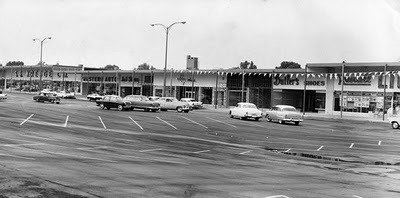


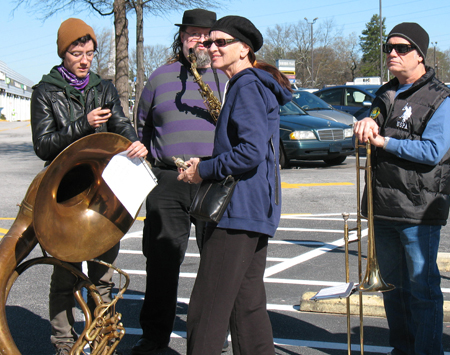
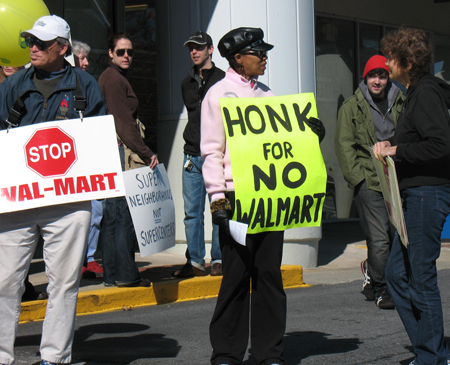


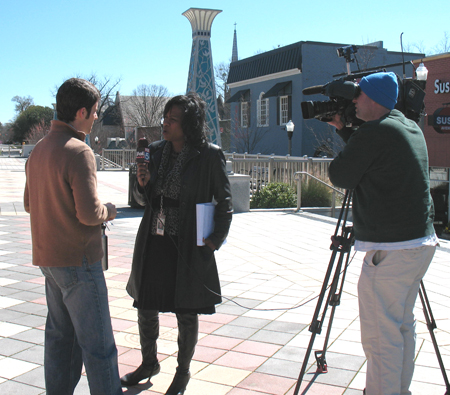

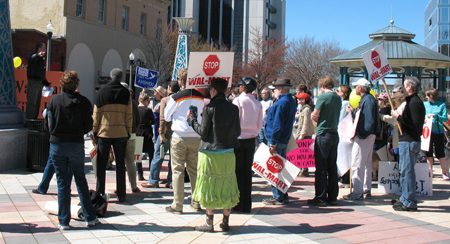


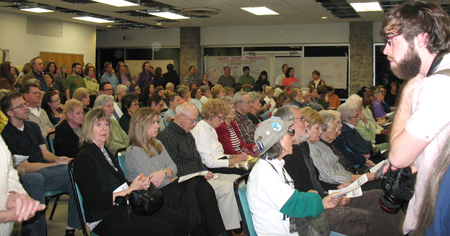
Does Wal-Mart Deserve to Be Hated?
By Stephen D. Simpson, CFA | More Articles
June 2, 2005 | Comments (1)
America’s largest retailer, Wal-Mart (NYSE: WMTÂ Â ) , is undoubtedly one of the most successful companies of modern times, but it also appears to be among the most disliked. Whatever the merits of the complaints levied against it, there’s no denying that Wal-Mart has become a target and a cause celebre amongst those opposed to big business. The question remains, though: Does Wal-Mart deserve this, and should investors be worried?
Unfair wages and benefits
First in the hit parade is the accusation that Wal-Mart systematically mistreats its workers, allegedly boosting its profits on the backs of ill-treated workers and blocking attempts at unionization. Critics point to low wages (even in comparison to other retailers) and few employee benefits as proof that Wal-Mart puts profits above worker welfare.
In some cases, state government officials have even asserted that Wal-Mart costs their states money — that workers have to rely more upon state-funded entitlement programs, because Wal-Mart allegedly doesn’t pay enough or offer enough benefits.
While I’m not going to assert that Wal-Mart is the best place to work, I’d offer a few counterpoints. First, the type of retailing that Wal-Mart does isn’t exactly known for paying famously great wages. Second, many large companies have fought hard to keep unions away, and Wal-Mart is in no way unique in this respect. For better or worse, Wal-Mart often offers jobs in places where there are few other jobs available — and to people with limited education and few employment options.
I’m not going to say that it’s completely fair that Wal-Mart pays comparatively less than other employers, but if Wal-Mart can fill its employment needs without offering higher pay or benefits, I’d argue that it has a certain obligation to its owners to do so.
So-called censorship
Another of Wal-Mart’s controversial practices is its policy regarding certain books, music CDs, magazines, and the like. Basically, Wal-Mart has chosen not to sell materials that could be perceived as controversial or offensive (generally in terms of language, theme, or sexuality).
Personally, this is my single biggest objection to Wal-Mart, and I have chosen not to shop there at all until the policy is reversed. But that’s my personal choice. Let’s be absolutely clear about something — this is not censorship. Pretty much every business in this country has the right to pick and choose what products it will sell. Wal-Mart, as a business, has the right to pick and choose the products it sells, and I, as a consumer, have the right not to shop at stores whose policies I don’t support.
Nevertheless, many consumers object to this practice and point to it as an example of Wal-Mart’s “tyranny” over its customers — particularly since it’s the only local retail option for books or music in many communities. Of course, there’s no reason why customers can’t use Amazon (Nasdaq: AMZNÂ Â ) to buy whatever Wal-Mart won’t sell them.
Squeezing suppliers
According to its critics, Wal-Mart has also built itself up by impoverishing its suppliers and taking an “unjust” slice of their profits. Not only can Wal-Mart largely dictate pricing, delivery, payment, and frontage terms, but it also has the power to make or break a business by choosing whether or not to carry its products at all. But that’s the retail business in a nutshell — margins are tight and everybody tries to squeeze everybody else whenever they think they can get away with it.
For those unfamiliar with the inner workings of retail, think of it as a capitalist food chain. As the apex predator, Wal-Mart can play suppliers like Kraft, Unilever (NYSE: ULÂ Â ) , and Procter & Gamble off against each other — sometimes dictating price and product-placement terms. These suppliers, in turn, squeeze their suppliers and play them off against each other to get the best terms possible. It may seem unpleasant, but that’s business. When you have the power to dictate terms to your advantage, you’re almost certainly going to use it.
Wrecking Main Street and American industry
Last, but not least, Wal-Mart has also been tagged as a destroyer of small-town Main Street and a threat to some American industries. It is claimed that Wal-Mart moves into small communities and wipes out the smaller mom-and-pop retailers that can no longer compete with the giant’s discount prices. Of course, nobody seems to mention that Main Street was on life support before Wal-Mart even started to get into the game on a national scale.
Enclosed shopping malls and other suburban retail concepts had already done their damage in many communities. What’s more, why should anybody expect small-scale retail to avoid the same fate that has befallen small-scale manufacturing, farming, and many service industries?
Wal-Mart has also been attacked for its buying practices — in particular, favoring cheap imports from countries like China, Bangladesh, or Mexico over American-made (but pricier) goods.
To me, though, these accusations are somewhat hypocritical. Here in my state, there are rampant complaints about American imports of textiles and furniture, yet many of those who complain drive away in Japanese cars and go home to watch DVDs with their Korean-made players. And so, too, in Detroit, Silicon Valley, or anywhere else — foreign imports are terrible when they threaten your job, but when they make your life easier or save you money, they’re just fine.
Wal-Mart’s real crime
In my humble opinion, Wal-Mart’s real sin is that it has been successful. Extremely successful.
Americans seem to have an odd sort of paranoid schizophrenia with respect to wealth. On one hand, we enthusiastically pat ourselves on the back for living in a country that offers unparalleled economic opportunity. On the other hand, Americans are generally suspicious and resentful toward the wealthy or successful, and “class warfare” is a time-tested political strategy.
Most people in this country hope to have more wealth each year and want their stock portfolios to rise, but we as a nation can often be squeamish about the details of how that’s accomplished. Simply put, Wal-Mart is an extant example of capitalism in a very pure form, and pure capitalism seems to chafe some Americans.
A question of PR?
The really interesting thing about Wal-Mart is how common its practices are across American industry. Much of what Wal-Mart does is done by other large companies, yet they escape the outrage and outcry.
Here at The Motley Fool, we have at least two former General Electric (NYSE: GEÂ Â ) employees among the writing staff and I’m related to a current employee. I’ve heard from all three about the extent to which GE will pressure suppliers and how it doesn’t always treat its employees in a completely warm, cuddly, or even fair manner. Johnson & Johnson (NYSE: JNJÂ Â ) is another company that is known to be a particularly firm negotiator with its suppliers, and terms are often presented in a “take it or leave it” fashion.
Moving along, how many coffee bars has Starbucks (Nasdaq: SBUXÂ Â ) pushed out of business, and couldn’t it afford to pay a little more to the people who pick its coffee beans? How many restaurants failed to withstand the onslaught of dirt-cheap fast food from the likes of McDonald’s (NYSE: MCDÂ Â ) ? If we’re talking Main Street, what has Home Depot (NYSE: HDÂ Â ) or Lowe’s (NYSE: LOWÂ Â ) allegedly done to the small local hardware shop?
No, it’s clear that Wal-Mart is not unique.
Does it matter?
A fundamental question for investors is whether popular opinion toward Wal-Mart really matters in the long run. Obviously Wal-Mart cannot succeed forever if potential customers choose not to shop there because of its policies, practices, or reputation. Long-term success does require a certain amount of cooperation and goodwill amongst customers, workers, and shareholders.
Shareholders should have some concern about how Wal-Mart is viewed by the larger world. No company really wants or welcomes greater government scrutiny or interference, and no company wants to see protests and websites devoted to complaining about it. Somewhere in between, then, every company needs to strike a happy balance between doing what’s best for the business in cold, hard numerical terms and what’s best for building long-term public goodwill.
For now, though, people may complain about Wal-Mart, but they still shop there. When push comes to shove, many Americans put their high-minded morality to the side and simply go with the cheapest merchandise they can find.
Conclusion
In some ways it’s too bad that Wal-Mart can’t enjoy more of its own success (though the heirs to Sam Walton’s fortune don’t seem overly glum). After all, Wal-Mart has built itself into a colossus principally because it has delivered what people want — when, where, and how they want it.
When it’s all said and done, perhaps Wal-Mart can find ways to smooth off its rough edges and join the likes of General Electric, Johnson & Johnson, and Home Depot as hugely successful companies that are generally well-liked (or at least tolerated) by the public at large.
For more Foolish views on these companies:
For All the Coffee in China
Dumping Home Depot
A Tale of Two Wal-Marts
Diagnosis: JNJ A-OK
Fool contributor Stephen Simpson owns shares of Johnson & Johnson. The Fool has a disclosure policy.
Stephen, I can see why you feel the need to defend Walmart – as a financial writer for Motley Fool, your objective is to inform shareholders about companies’ market health.
As you did back in 2006, blithely advising that Monsanto would have ‘more green harvests to come.’ I guess you were a little early to the science that has found disturbing DNA damage from Roundup’s indiscriminate and ubiquitous use.
However, as a grass-roots organizer, my objective is to warn the public about EPA violations and other government guidelines that big-box chains like Walmart consistently either ignore or cross. The fines that these corporations end up paying for asbestos violations during demolition will never mitigate the damage done to surrounding neighborhoods and their inhabitants’ health.
It’s not all about jobs and low pricing. Although those mainstay reasons are unjustified as well; in my own research with local Walmarts, I could not find lower or even competitive pricing on products, especially in their groceries. In fact, our local Dekalb Farmers Market had cheaper produce by sometimes half.
Economics studies across the country have shown that big box stores do not create jobs that are sustainable, and that most of the profits go to outside their local communities. Local retailers were found to generate 3 times the local economic activity as the chain store. A UC Irvine study (Effects of Wal-Mart on Local Labor Markets) found that for every new retail job that Walmart creates, 1.4 jobs are lost as local businesses downsize or close.
A Penn State study in 2004 found that with more additions of Walmart stores over 10 years, from 1987-1998 – poverty rates increased during the 1990s – when there was an economic boom.
The DC based Economic Policy Institute study of 2007 found that “While Wal-Mart was responsible for 9.3% of U.S. imports in this period, it was responsible for 11.2% of the U.S. job losses due to growing trade deficits with China. Since Wal-Mart’s exports to China were negligible, the rapid growth of its imports had a proportionately bigger impact on the U.S. trade deficit and job losses than overall U.S. trade flows with China (since the rest of U.S. trade with China does include significant U.S. exports to that country). On average, each of the 4,022 stores Wal-Mart operated in the United States was responsible for the loss of about 77 jobs due to Wal-Mart’s trade deficit with China in 2006.”
A 2006 article by Barry Lynn in Harpers Magazine suggests that Walmart is ripe for anti-trust action: “The idea that Wal-Mart’s power actually subverts the functioning of the free market will seem shocking to some…the issue before us is not how Wal-Mart grew to scale but how Wal-Mart uses its power today and will use it tomorrow. The problem is that Wal-Mart, like other monopsonists, does not participate in the market so much as use its power to micromanage the market, carefully coordinating the actions of thousands of firms from a position above the market.”
As for people still shopping at Walmart? Not sure about that claim either. Recent business mags say no. Your own Motley Fool posted an article just last month suggesting that “consumer trends are slowly killing Walmart.” There is the shift to online shopping, and the innovations that its competitor Costco has put into place – an employee owned chain with good labor practices.
But beyond those issues, more people are realizing that supporting their local infrastructure means a healthier local economy. The small farms and slow food movements are two sustainable forms of business that have swept the country over the past decade. A 1960’s type Walmart superstore just doesn’t fit with an urban and densely populated area that has pedestrian centered shopping opportunities.
I am very confused about Stephen’s comment and how it applies particularly to THIS proposed Walmart.
Stephen writes: “Wal-Mart often offers jobs in places where there are few other jobs available…” and “…Main Street was on life support before Wal-Mart even started to get into the game…” This simply is not true of the area this Walmart is coming in. Homes directly behind the proposed location start at around 380K and quickly go up. Furthermore, downtown Decatur, a mere few miles away from the site, is thriving with mom-and-pop stores. IT IS EXACTLY WHY people flock to move to this area of Decatur. To get away from the typical Walmart filled suburbs. We are a community that lives and loves the small stores and restaurants that are spread throughout. Read any neighborhood forum board and you will see a passion regarding the uniqueness and love of our indie community that I have seen unmatched.
Very few people that live in this area of Decatur will shop at Walmart. However, it will lower our property values, bring horrific traffic (that our roads are not designed for), and attract a criminal element that Walmarts so often do. This is what is meant also – points you missed – that Walmart destroys communities.